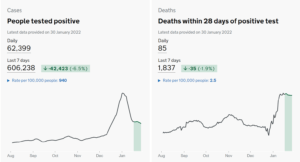Covid-19 in UK: All you need to know … Dr. Bashir Odeh

Two years ago, the unexpected happened when the Covid-19 pandemic started. On 29 January 2022, the first case in the UK was recorded among two Chinese workers in York, North of England.
Covid – 19 Numbers in The UK:
- Number of total Covid – 19 cases since the start of the pandemic
16.5 million (about 24% of the population) - Number of total deaths caused by Covid – 19 since the start of the pandemic
155 thousand (0.0023 percent of the population, or 0.01 percent of the total number of cases). - Average numbers of active cases in the last week
86,000 Case
On 29 January, there were 72,000 cases and 296 deaths. But this week’s numbers were less than the previous one by 3.6%. - People who got the first dose of the vaccine
52 Million people (Almost 92% of the population) - People who got the second dose of the vaccine
48 Million people (Almost 84% of the population) - People who got the booster dose of the vaccine
37 Million people (Almost 64% of the population) - Number of people hospitalised because of Covid – 19
On 27 January, there were 16,000 people hospitalised

Contains public sector information licensed under the Open Government Licence v3.0.
The current Covid-19 situation can change based on two factors:
-
Vaccination
-
Social Distancing
The UK is the sixth richest country in the world, this had helped the funding of vaccines and the high rate of vaccination in the country. And when it came to lockdown and quarantining, the UK was able to provide funding to the people to help them in this hard time.
Those factors had also helped the UK to be one of the first countries to remove most of the Covid-19 restrictions, even when the Omicron wave hit, and the daily cases reached 52,000 cases, the UK was ready again to remove most restrictions by the end of December in 2021.
How did the UK fight the Omicron wave?
after the UK ended most of the restrictions, the number of the cases had risen again to reach 175,000 per day by mid of January in 2022.
And following so, the government had tried to employ some of the restrictions again. And it also started a huge campaign to increase the number of booster vaccines given to reach half a million per day. This had helped the cases to drop again to 90,000 cases by last week.
Most restrictions have now been removed, and many employees had gone back to work from their offices Today, 31 January, for the first time in two years.

How to deal with the recent variant?
According to a new study by Wales, 58% of Covid-19 hospitalised patients did not need any Covid-19 related medicines. Which shows how the new Variant – Omicron – is weak compared to the previous one – Delta -. (https://ironman.greaterzion.com/)
Hospitals now used the new medicine verified by the FDA named PAXLOVID, which can even lower the rate of both hospitalisation and death numbers by 89%.
New Variant
on January 29th, 2022, a new variant for the Omicron had been discovered in the UK in around 10,000 cases, but it was dismissed as “not worrying”.
On the bright side, in a study published by BMJ it was shown that common and severe infections between children had decreased during the Covid-19 pandemic.
the study is still monitoring whether there is a correlation between Covid-19 and the results or was it just due to the social distancing, masks, and better hygiene practices.
Britain (with all its capabilities and leadership in the medical field) is still part of its international and global environment, and it will remain completely under the influence of all epidemiological developments in the world, and therefore it must assume its responsibility towards protecting the entire population of the world from these epidemics.
Dr. Bashir Odeh
Board Member, Association of Palestinian Doctors in Europe (UK Branch)
Sources:
BBC: Covid-19 in the UK: How many coronavirus cases are there in my area?
Oral COVID-19 antiviral, Paxlovid, approved by UK regulator
ShortURL ⬇

